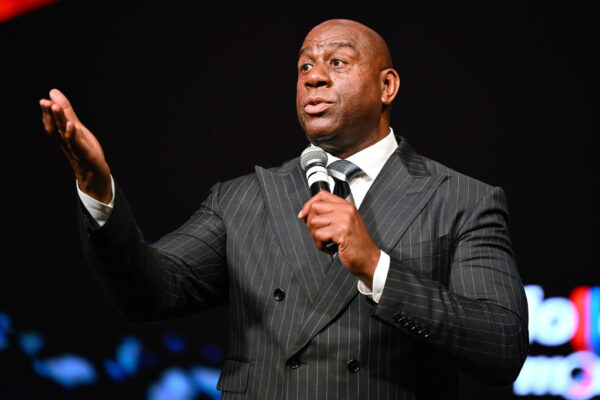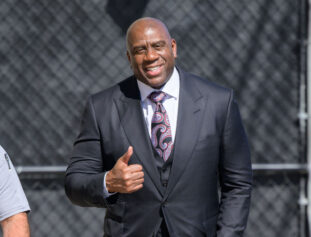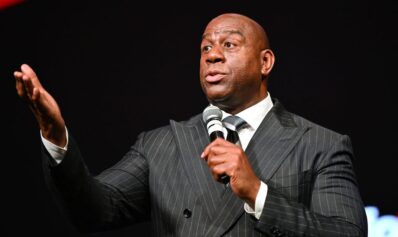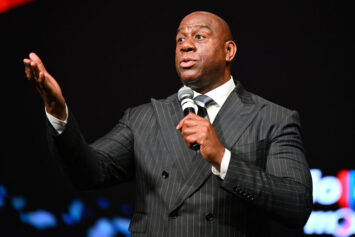NBA legend Earvin “Magic” Johnson said that his announcing that he had HIV in 1991, retiring, and his failed talk show, “The Magic Hour,” were the catalyst to him exploding as a businessman. With a renewed vision for his life, he was able to attract partners like Starbucks that would put him on the trajectory to have a $1.2 billion business portfolio.

However, none of this would have happened if it weren’t for his wife, Whitney Houston, Angela Bassett and the other ladies in the cast of “Waiting to Exhale.”
Magic sat down with Maverick Carter on his “Kneading Dough” podcast in 2019 to share how he hit rock bottom after he shared with the world his health status, thrusting him into retirement.
“The companies that were sponsoring me at that time (I had a lot of sponsors), they all dropped me,” he recalled, adding, “So now, I said ‘OK what are you going to do Earvin?’”
He said for six months, he was “upset” and “frustrated,” but his wife, Cookie Johnson stepped in and put him on the right track.
“My wife came home one day and she changed my life. She said you have talked about being a businessman, so it’s time for you to start thinking about getting into business. Get out the house and don’t come back until you become the man that I married,” he said.
Since hanging up his basketball jersey in 1991 — he made a comeback with the Lakers for one season in 1995-1996 — Johnson has directed his energies towards the expansion of Magic Johnson Enterprises, an illustrious conglomerate he established in 1987.
Magic, The Businessman
In the span of the last thirty years, since he got serious about MJE, Magic has strategically diversified his investment portfolio, securing stakes in prominent establishments such as Burger King, 24-Hour Fitness, TGI Fridays, and his crown jewel, Starbucks.
But even before leaving the NBA in 1996, during the peak of his career and fresh off an MVP season, Johnson acquired a controlling stake in a Pepsi-Cola Co. bottling plant for an estimated $60 million in 1990. Teaming up with Black Enterprise founder Earl Graves, they established the largest minority-owned and operated Pepsi facility in the nation at the time.
This savvy maneuvering has culminated in an impressive accumulation of over $1 billion in investments, spanning across a multitude of industries within his business empire.
Notably, Johnson’s involvement with Starbucks stands out as a testament to his foresight and influence. Championing the expansion of the renowned coffee giant into underserved Black communities, Johnson personally acquired over a hundred Starbucks stores —a bold move that reaped substantial rewards.
During the 1990s, Starbucks, headquartered in Seattle, was undergoing exponential expansion, blossoming from a modest count of a few hundred stores to more than 2,000. Despite this level of success, the coffee shop was visibly absent in underserved urban communities. It wasn’t until 1998 when former Los Angeles Lakers star pitched a compelling business proposition to then-CEO Howard Schultz that this dynamic began to change.
Initially skeptical, Schultz’s doubts were put to rest when the then-future Hall of Famer invited him to a screening at one of the inner-city movie theaters operated by Magic Johnson Enterprises.
“Our biggest screen had 500 women inside. All of a sudden every woman thought she knew Whitney Houston personally and started talking to the screen. So Howard grabs me about 20 minutes in and says, ‘Earvin, I never had a movie-going experience quite like this,’” Magic said during a presentation at the Wharton business school in 2010. “Guess what happened? That got me the deal.”
Schultz witnessed firsthand Magic’s astute grasp of the market and how, with an authentic strategy that supported the community with jobs as well as sold them high-priced cups of joe, they could penetrate.
Magic said that working with Schultz is “was what really stamped me as serious businessman.”
The groundbreaking Starbucks Deal
Starbucks forged a powerful partnership with the basketball icon and launched the creation of the Urban Coffee Opportunities organization
“Through our partnership with Starbucks, we were able to serve as an economic catalyst in urban cities through the creation of new jobs, use of local suppliers, support for community-based organizations, and by attracting other retailers to the area,” Magic said, according to Starbuck’s website page for UCO.
This collaboration bore fruit with the establishment of a massive number of cafes in urban hubs such as Harlem, New York, and Crenshaw in Los Angeles — destinations that would later evolve into Starbucks’ Community Stores.
He only looks back at this time as the catapult for his career in industry.
“That deal changed everything. We built 125 stores. We made that deal happen and that’s what really put me on a path of success,” the All-Star said.
Adding, “It showed everybody that I could drive ROI in urban America.”
Magic’s shrewd decision-making was affirmed in 2010 when he lucratively sold back these establishments to the company for a staggering $100 million, marking a lucrative culmination to a visionary investment endeavor initiated two decades prior.




